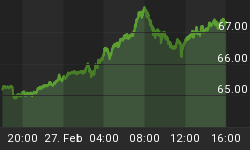No matter what we do, we are doomed. No matter what we don't do, we are doomed. These seem to be the two current camps of thought at the present time. I'm not sure if my "radar" is in perfect functioning order, but it seems the world is increasingly becoming "out of whack". Exactly what "out of whack" means is basically relative to the person whom it affects. This can either be positive or negative. To people like Stephen Roach, the world is precariously imbalanced and needs these macro imbalances to be resolved or the risk of a "meltdown" grows nearer. To a certain degree he is totally correct. On the other hand, to a Chinese official, the world is probably looking pretty good -- albeit out of whack as when compared to his former life in a grey factory -- with increased world-wide exports, increased quality of life and the consumption of luxury goods and quietly he grins inward and is joyous at the "nasty westerners" being dependent on his peoples exports. Macro economics scenarios likely play no large and forefront role in his world.
I have read recently, going back to my indexed "pile of papers" on the floor, an article written in 1980. It was written by an American grandfather to his grandchildren and he lamented about the entire economic decay and the lack of fiscal "backbone" of the politicians and how the entire debt (at that time) would bury the US Dollar in the coming few years - he urged his grandchildren to buy gold. Obviously he had been through the 1930s Depression. Was he right in 1980? On a certain level, yes. But, also no. Again it is all subjective.
I am going to go out on a rather unorthodox limb and try to explain all this economic "stuff" which we seem to be caught up in. For every article where I read "white" from an experienced market person or intellect or guru, I then read an article "black" which states entirely the opposite, and with an equally intellectual and seemingly strong base of information to support his/her viewpoint.
I currently believe the explanation lies simply in human psychology. In mechanical systems, transitional states which lead to a break down usually occur along fixed physical and known quantities or levels. The stress or fracture point of material, the temperature swings a material can withstand, etc. The fracturing or breaking occurs along these known parameters, usually. The human being is much more resilient. But equally, the human is much more subject to perceptional aspects and thus any fractural stressing points are not fixed and known. They are likely more adhering to the chaos theory. I currently believe we are in such a period of complexity where the human psychology in the West will determine the marketplace. Of course this does not occur in a vacuum - the macro economic parameters must also accommodate the raw numbers.
On paper, the Roach's of this world grind numbers and look at GDP and percentage of debt and compare it to historical data, etc. etc. etc. In their eyes, the US and other western States are treading dangerously high debt loads along with gross trade imbalances and savings next to nothing. Indeed, this is a "cocktail of doom" on a pure numbers basis. But the consumer, being a complex and usually rather irrational animal, would not know a GDP from a MPG from a QED. You know, it's just numbers, it will be alright. We've always made it through.
This is exactly my point. The psychological "tipping point" has not been reached yet. The chaos principle has not yet kicked in. From a purely rational and logical point of view, the State could curb outgoing costs, could have raised interest rates long ago to curb consumption and increase savings, etc. It was not done. The consumer, could have simply stopped buying on credit, paid down existing debt, etc. Alas, we are human and lazy and think the good times will last forever.
And that is maybe the key word - "think" - so long as people think that things will work out, maybe they will. But as soon as the mass psychology tips too far to the "What have we done? This is not sustainable and is pure insanity" will the markets react, and likely also too far to the other side.
Currently we just don't know "how far to the other side" things might tip and it is exactly that fear which drove that grandfather to write about gold as in investment. I think that is also why gold and silver are coming back in vogue. I believe people intuitively feel that things are "out of whack and not sustainable at their current pace respectively imbalance. I also believe that western government officials know this current state of fiscal affairs is currently VERY precarious. They are trying to macro-manage and massage the data to keep the masses from not tipping over into mass hysteria on the down side.
I truly believe they are deathly afraid of this scenario. But strangely, they show little desire to truly tackle the logical issues which would deflate this potential tipping point. It sort of reminds me of a sanatorium where all are insane but nevertheless the people inside expect one of them to stand up and lead them out. It will likely not happen. Which reminds me: What is the definition of insanity? Doing the same thing over and over again while expecting different results. Our fiscal and monetary officials are now classified as insane, to my way of thinking.

Whenever the tipping point does come, then I believe the final rush will be into commodities and not more printed paper, commonly referred to as "money" and electronic debt. By that time, "money" will be referred to as toilet paper and DEBT will be the nastiest of four letter words.
People will be looking for and asking for and demanding tangible assets.















